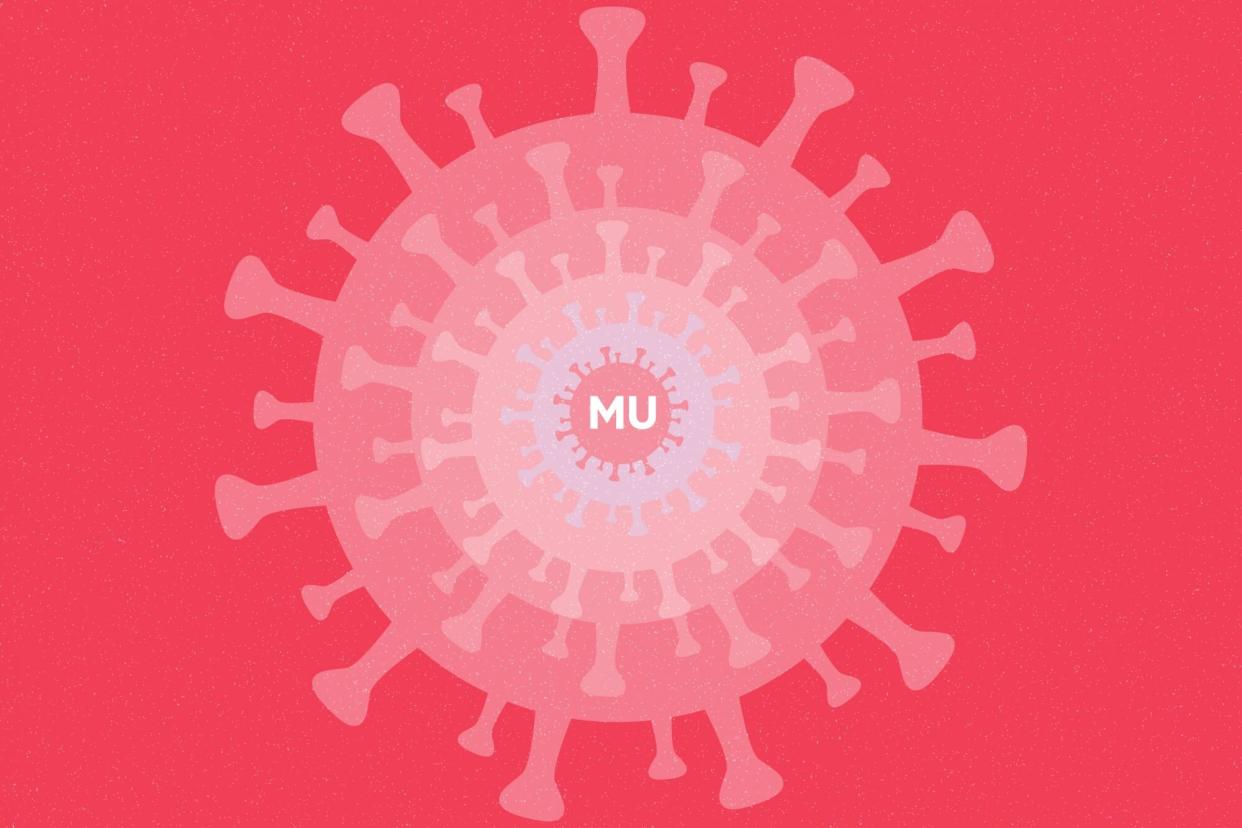What Is the Mu Variant of COVID-19?

Getty Images
These days, it seems as if you can't scan the news without seeing a COVID-19-related headline. And while the highly contagious Delta variant is still very much on everyone's radar, it seems there's another variant that global health experts are monitoring. (Related: What Is the C.1.2 COVID-19 Variant?)
The B.1.621 variant, better known as Mu, has been placed on the World Health Organization's list of SARS-CoV-2 variants of interest, which are variants "with genetic changes that are predicted to affect virus characteristics," such as transmissibility and disease severity, among other factors. As of Monday, August 30, the WHO is closely monitoring the spread of Mu. Although developments about Mu are still ongoing, here's a breakdown of what's currently known about the variant. (ICYMI: How Effective Is the COVID-19 Vaccine?)
When and Where Did the Mu Variant Originate?
The Mu variant was first identified through genomic sequencing (the process used by scientists to analyze viral strains) in Colombia back in January. It currently accounts for about 40 percent of cases in the country, according to a recent weekly bulletin from the WHO. Though other cases have been reported elsewhere (including South America, Europe, and the U.S., according to The Guardian), Vivek Cherian, M.D., an internal medicine physician affiliated with the University of Maryland Medical System, tells Shape it's too early to unnecessarily worry about Mu. "It's concerning that the prevalence of the variant in Colombia is consistently increasing, though the global prevalence is actually below 0.1 percent," he tells Shape. (Related: What Is a Breakthrough COVID-19 Infection?)
Is the Mu Variant Dangerous?
With Mu currently listed as one of WHO's variants of interest, it's understandable if you feel unsettled. But it's also worth noting that, as of now, the Centers for Disease Control and Prevention has not listed Mu under its variants of interest or variants of concern (which include variants, such as Delta, that have evidence of increased transmissibility, more severe disease, and reduced effectiveness in vaccines).
As for Mu's makeup, the WHO notes that the variant "has a constellation of mutations that indicate potential properties of immune escape." This means that the immunity you currently have (either obtained via a vaccine or natural immunity after having the virus) may not be as effective compared to previous strains or the original SARS-CoV-2 virus (the Alpha variant), due to genetic mutations identified in this particular strain, says Dr. Cherian. Monoclonal antibody treatments, which are used to mild-to-moderate COVID-19, may also be less effective against the Mu variant, he says. "All of this is based on a review of preliminary data which showed reduced effectiveness of antibodies obtained from vaccination or prior exposure." (Read more: Why Are the New COVID-19 Strains Spreading More Quickly?)
As for Mu's severity and contagiousness? The WHO is "still in the process of gathering more data, which will determine the variant's ability to cause more severe disease, be more transmissible or have reduced effectiveness of treatments or vaccines, which is the current concern" according to Dr. Cherian. Given how fast the Delta variant rose around the globe, "there's certainly a chance [Mu] can be upgraded to a variant of concern," he says.
Still, he reiterates that "ultimately, all this is based on early information, and more time and data is needed to make any definitive statement regarding the Mu variant." It's too early to tell if Mu will become a particularly worrisome variant for fully vaccinated Americans. "You can't make any generalizations from the fact that Mu is listed as a variant of interest," he says.
What to Do About Mu
"A virus's ability to become dominant ultimately depends on two primary factors: how transmissible/contagious the strain is and how effective it is at causing severe disease and or death," says Dr. Cherian. "Virus mutations are constantly occurring, and ultimately any mutation(s) that cause a particular strain to be more contagious or more lethal (or worse, both), are more likely going to have a higher chance of becoming dominant."
Right now, the best lines of defense include wearing masks in public and indoors when not with people from your household, completing your vaccination doses, and getting a booster shot when you're eligible (i.e. eight months after your second vaccine dose for Pfizer-BioNTech or Moderna recipients, according to the CDC). These are among some of the most effective tools to help you keep COVID-19 and all its variants at bay. (FYI: Johnson &Johnson hive, your booster recs are on the way soon.)
The information in this story is accurate as of press time. As updates about coronavirus COVID-19 continue to evolve, it's possible that some information and recommendations in this story have changed since initial publication. We encourage you to check in regularly with resources such as the CDC, the WHO, and your local public health department for the most up-to-date data and recommendations.
